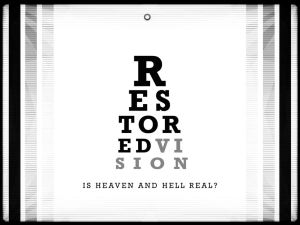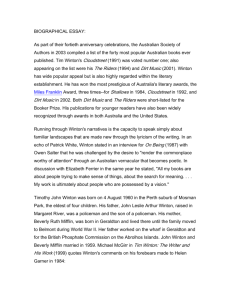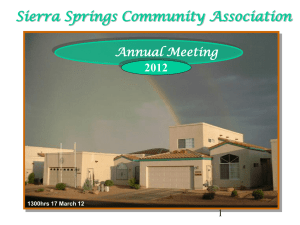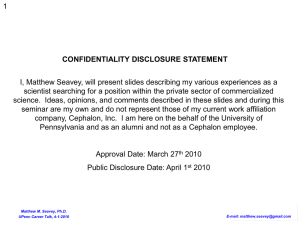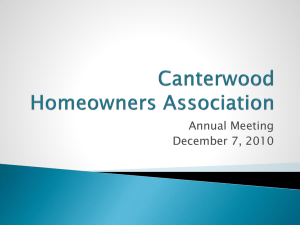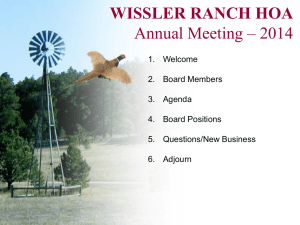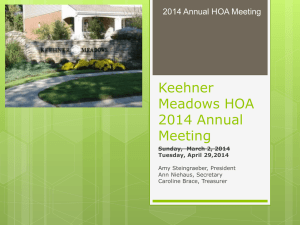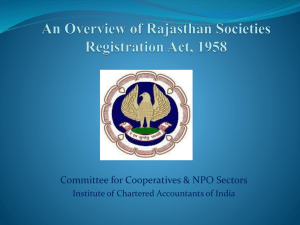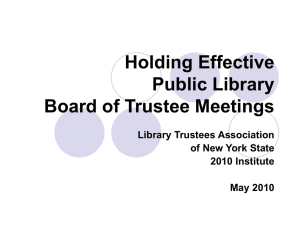2014 Basics Course – Presentation
advertisement
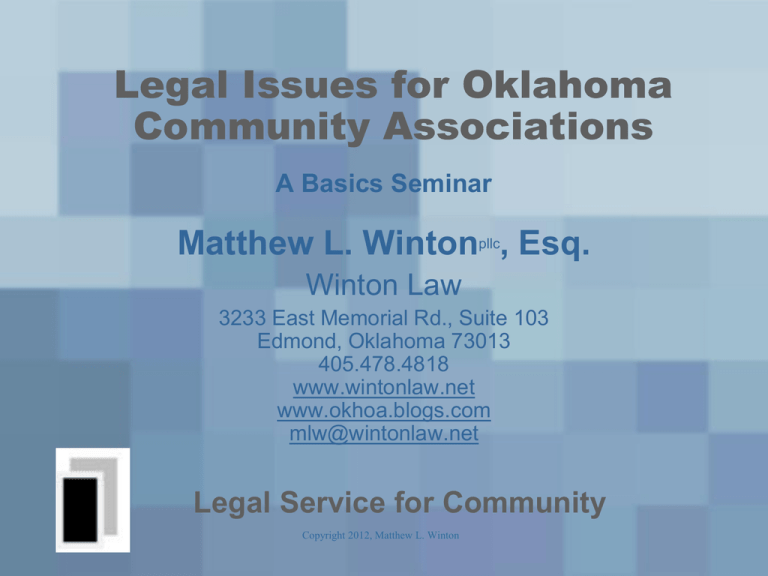
Legal Issues for Oklahoma Community Associations A Basics Seminar Matthew L. Wintonpllc, Esq. Winton Law 3233 East Memorial Rd., Suite 103 Edmond, Oklahoma 73013 405.478.4818 www.wintonlaw.net www.okhoa.blogs.com mlw@wintonlaw.net Legal Service for Community Copyright 2012, Matthew L. Winton Disclaimer Proper application of the law depends on facts. Because the speaker has not taken into consideration the specific facts of your situation, it would be unwise to rely on any statement in these materials or provided by the speaker as legal advice. The law firm of Winton Law only engages clients through a written engagement contract. Until you or your organization enters into such an agreement, you and your organization are not clients of the firm, and no attorney-client privilege is created between you and the firm; the speaker does not represent you; and you cannot rely on these materials as legal advice. If you have legal questions, you should consult a competent attorney practicing community association law. HOA Basics Seminar What documents, agreements, and instruments create the HOA and give it its authority? Documents - Overview • • • • • • • Plat Declaration of Covenants Certificate of Incorporation Articles of Incorporation Bylaws Corporate Resolutions Rules & Regulations Copyright 2012, Matthew L. Winton Documents – Plat Copyright 2012, Matthew L. Winton HOA Basics Seminar What is “law” and what law applies to HOAs, boards, and members? Law – Overview The law of HOAs • The applicable law is published cases and statutes – 60 O.S. 501 et. seq. – Condo Act – 60 O.S. 851 et. seq. – HOA Act – 18 O.S. 865; 1001 – Corporation Act • Where is it? Access the law at www.oscn.net • Recent changes: Lending requirements: FHA/VA (condo projects) Copyright 2012, Matthew L. Winton Law – Parliamentary Procedure Applicable Case Law • Horry v. City of Tulsa, 2004 OK CIV APP 13 (tie vote means no decision, NOT a “no” decision) [No RONR] • Stone v. Dean, 1959 OK 111; Estes v. Tompkins, 1962 OK 47 (What constitutes adequate notice?) [Yes RONR] • Oldham v. Drummond Bd. Of Educ., 1975 OK 147 (Statute controls over RONR) [No RONR] Copyright 2012, Matthew L. Winton Law – Parliamentary Procedure Applicable Case Law, cont’d • Bonney v. Smith, 1944 OK 149 (On a 3 member board, ¾ vote requirement means all 3 members approving) [No RONR] • Gelder v. Loomis, 1980 OK 10 (Motions to limit discussion permissible under “normal parliamentary procedure.” [No RONR] • First Nat’l Bank v. Daugherty, 1926 OK 876, ¶14, 17; Hartford Accident & Indemnity Co. v. City of Sulphur, Okl.,123 F.2d 566, 571 (10th Cir. 1941) minutes are prima facie evidence of meeting events. Rebuttable presumption. Copyright 2012, Matthew L. Winton Law – Unincorporated Associations The Law of Unincorporated Associations • An unincorporated association is when “two or more people associate themselves together and transact business for gain or speculation under a particular appellation.” • Bylaws, common law, and various statutes are “the law” of the entity. • The unwritten law: friends don’t let friends join unincorporated associations. Copyright 2012, Matthew L. Winton Meetings - Practice • Annual Meetings – – – – Same time each year Written agenda, notice given prior to meeting Provide childcare and refreshments – advertise! Use proxies to attain a quorum • Board Meetings – Open Meeting Act does not apply automatically – Should occur at least quarterly • Meeting Tips – Prepare and follow an agenda – Limit the floor to minutes and recognized speakers – Hold hostile meetings in a church or elementary school Copyright 2012, Matthew L. Winton Meetings - Minutes & Resolution Practice • Resolutions document decisions/acts of the association. • Sometimes done when awarding contracts for common area maintenance, or for substantial corporate events, such as taking legal action or policy positions. • Minutes and Resolutions are the written record of the corporation and should be kept together for future boards. • Minutes are prima facie evidence in court • See www.okhoa.blogs.com for samples of a resolution, meeting agenda, and minutes. Copyright 2012, Matthew L. Winton Meetings - Default Procedural Rules (“UOP”) • UOP, Bylaws adopted/amended by “governing body.” • UOP, quorum is 1/3 of total membership (Can be much less) • UOP, majority vote except for election of directors. • UOP, plurality vote for directors. • UOP, Min. 10 / Max. 60 days notice Copyright 2012, Matthew L. Winton Meetings – Quorum Quorum under the Law • A quorum is “Such a number as must be present in order that business can be legally transacted.” RONR, p.334-340 • What does Articles or Bylaws provide for quorum? • If incorporated, 18 O.S. 1060 provides for 1/3 of total membership, but may be less. • For court-ordered election, the quorum is the number of members present regardless of actual quorum requirement. Copyright 2012, Matthew L. Winton Meetings – Proxies Proxies – A Primer • 18 O.S. 1057.C & D – Proxy must be signed or have signature “affixed” to writing – Electronic copies are acceptable • 18 O.S. 1060 – UOP, proxy is valid for 3 years • RONR disfavors proxy voting • Limited proxy? Voting proxy? Copyright 2012, Matthew L. Winton Meetings Internet/Electronic Voting/Email • Use the Internet to communicate – Governing documents – Newsletters/events – Contacts • Remember the “Newspaper Rule” when using email among board members • Electronic voting is allowable by Oklahoma Law; may require governing document amendments. Copyright 2012, Matthew L. Winton Meetings - FAQ 1. Does the Open Meeting Act apply to community associations? 2. Do members have a right to call special meetings? 3. Do members have a right to remove board members? 4. Can I vote electronically? 5. Can we act without meeting? 6. Class A members and Declarant Class B: What does it mean? Copyright 2012, Matthew L. Winton HOA Basics Seminar Why would we amend our governing documents? How do we do it? Amendments – Reasons Why 9. No shooting from boats, except for cripples, and in no event shall a motor be ‘running’ in so doing. (The boat shall not be in forward motion. Copyright 2012, Matthew L. Winton Amendments - Overview Gov. Doc. Amendments • Why? Defective/obsolete language, grammatical errors, change in law and/or facts, remove defunct Declarant language. • Follow amendment provision within document. • 11 O.S. 42-106.1 • Absent special amendment provision, each Lot owner must execute a notarized ballot to be filed with the amendment • Covenants – Regular and intentional oversight – Special amendments – 11 O.S. 42-106.1(D) • Bylaws – Board and member amendments – 18 O.S. 1013 Copyright 2012, Matthew L. Winton HOA Basics Seminar What are the rights, responsibilities, and remedies with assessments? Assessments: Overview • Four types: Annual, Special, and Specific/Individual, Reserve (See, CAIRF BPR for reserves) • Procedure: Accounting system; Owner tracking; invoicing, title companies • Collections: Communication; customer service; Liens; Judicial actions • Costs and Attorneys Fees Copyright 2012, Matthew L. Winton Assessments Collections • Periodic review of amount • Consistent application of interest • Uniform invoicing and collections; title company contact • Systematic preparation and filing of liens • Small claims actions • Foreclosure of liens Copyright 2012, Matthew L. Winton HOA Basics Seminar How are governing documents enforced? What “teeth” do they have? Dispute Resolution Overview • • • • • • • Clear, up-front communication Room for honest disagreement Informal Mediation Binding arbitration Penalties: no vote, no common area Monetary Fines Small Claims Court – Collections of assessments and fines – Amounts under $7,500.00 • District Court – Injunctions, damages – Declaratory actions (honest disagreement) Copyright 2012, Matthew L. Winton HOA Basics Seminar What records are members entitled to and when may they demand them? Operations – Books & Records Books & Records: Rights to Access • • • • • 18 O.S. 1065 (if incorporated) 18 O.S. 1069 – form of records 60 O.S. 521 (for condo) None for HOA What do Governing Documents provide? • “Proper purpose” Copyright 2012, Matthew L. Winton Operations - Books and Records • Consist of Financials, Governing Documents, Owner Files, Litigation/Enforcement Files, Minute Book/Organizational File • Governing Documents may outline member rights to the books and records • If incorporated, Oklahoma law grants access to members • See www.okhoa.blogs.com for an article on records access Copyright 2012, Matthew L. Winton Operations – Board Statutory Immunities • 18 O.S. 865-867 • 18 O.S. 1027(E): A member of the board of directors, or a member of any committee designated by the board of directors, in the performance of the member’s duties, shall be fully protected in relying in good faith upon the records of the corporation and upon information, opinions, reports, or statements presented to the corporation by any of the corporation’s officers or employees, or committees of the board of directors, or by any other person as to matters the member reasonably believes are within the officer’s, employee’s, committee’s or other person’s competence and who have been selected with reasonable care by or on behalf of the corporation. Copyright 2012, Matthew L. Winton Operations – Myths Have you ever heard… • “My neighbor’s fence doesn’t comply with the covenants, so I’ll sue the HOA.” • “Plant more trees in the Common Area or else…” • “The Board doesn’t enforce the covenants, so I’m not paying my assessments.” • “I never received a copy of my covenants, so they don’t apply to me.” • “You can file a lien, but you can’t foreclose.” Copyright 2012, Matthew L. Winton 30
